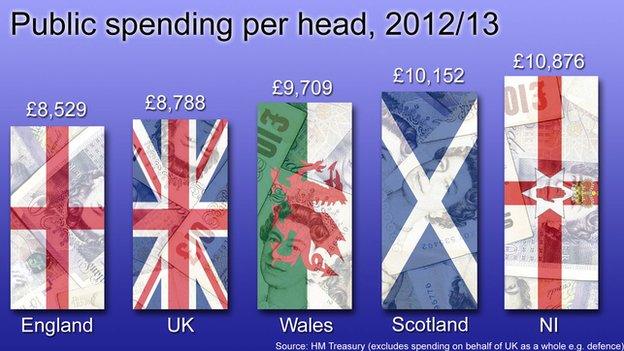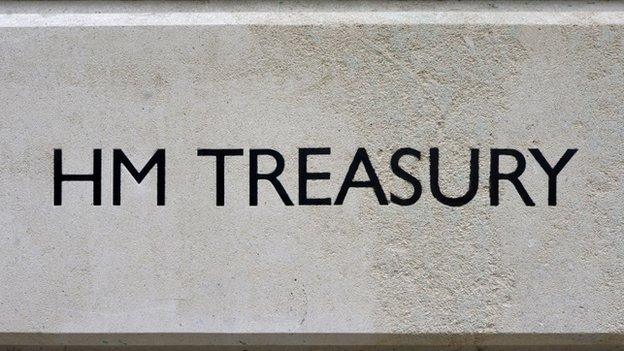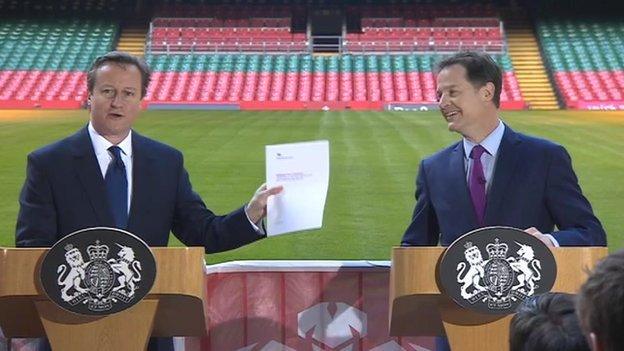Wales income tax power logical next step, Jones says
- Published
Carwyn Jones says Scotland is being offered more powers with no strings
Handing control of income tax to the Welsh government is a "logical next step", as long as a deal can be reached on the size of the national budget, the first minister has said.
UK ministers want Carwyn Jones to hold a referendum on devolving control over 10p in the pound of income tax.
But he appears to have dropped his insistence that a referendum is needed.
The UK government said it was "right" that Mr Jones was "now willing to embrace income tax powers for Wales".
Plaid Cymru and the Liberal Democrats have welcomed the change of stance, but said it should have come sooner.
However, the first minister maintained his insistence that income tax powers should not be devolved until a new funding deal is struck with Westminster.
In a speech in London on Friday, external he said he will "always consider proposals providing they are fair to Wales".
'Flexibility'
"I am instinctively pro-devolution and I can see the merits, in principle, in different parts of our Union being able to decide on the balance between levels of taxation, including those on personal incomes, and the level of resources for public services.
"But I have been absolutely clear that until we have a fair funding settlement it is not in the best interests of Wales to have income tax devolved."
The first minister added: "Having the flexibility to set taxes to respond to the needs of Wales and the preferences of Welsh citizens within a fair funding model is a logical next step."
Mr Jones has previously said that a referendum must be held before powers over income tax are given to the Welsh government.
But before the speech he told BBC Wales: "It's beginning to look increasingly strange of course that Scotland is getting a raft of powers - way beyond what Wales would get - without a referendum.
"I've no doubt ... if income tax-varying powers were offered to Northern Ireland there wouldn't be a referendum there, but in Wales we have to have a referendum."

Referendums should be reserved for "major constitutional issues and not for a bit of power here and there", he added.
Asked if Welsh voters should expect a referendum soon, he said: "We are not at that stage. We know the first thing to do is to consider a financial settlement that's fair to Wales and then consider what happens next."
In response, a Wales Office spokesman said: "We note with interest the first minister's comments that a referendum is not needed before income tax is devolved.
"This echoes the views of some others in the emerging debate around more accountable government in Wales."
Plaid Cymru welcomed "any late conversion" of Mr Jones to its position against the need for a referendum on income tax devolution.
Party leader Leanne Wood said: "It's a shame that previously both Labour and the Conservatives together have insisted on putting obstacles in the way of progress on Welsh income tax."
Too generous
Welsh Liberal Democrat leader Kirsty Williams said it "would have been nice" if the first minister had possessed the "strength of character to speak up a little bit earlier".
"I welcome his change of heart, but his challenge now is to convince his party of the same argument," she added.
Welsh Conservative leader Andrew RT Davies said Mr Jones should concentrate his efforts on "the significant problems in the public services he runs, not least within his NHS".
Public spending per head is higher in Wales than in England, but Welsh politicians claim the so-called Barnett formula used by the UK Treasury to allocate resources is too generous to Scotland and Northern Ireland, and underfunds Wales by as much as £300m a year.
The UK government is planning a guaranteed minimum level for the Welsh government's annual grant - expected to be between 13% and 16% higher than English public spending levels.

Analysis by Daniel Davies, BBC Wales political correspondent
Opponents say Carwyn Jones has changed his tune.
But the first minister's aides say the opposition is making mischief. This is a change in tone, not policy, they say.
Mr Jones is sticking to his line that Wales needs a guarantee it won't lose out before receiving these tax powers.
However, whereas in the past Labour has stressed the risks of tax devolution, Mr Jones has now laid out a path towards making it happen, providing a deal can be struck on the size of the Welsh budget.
- Published20 May 2015

- Published27 February 2015

- Published27 February 2015

- Published17 December 2014

- Published6 April 2016
